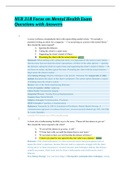Exam (elaborations)
NUR 318 Focus on Mental Health Exam Questions with Answers
- Course
- Institution
NUR 318 Focus on Mental Health Exam Questions with Answers 1. A nurse overhears a hospitalized client with mania telling another client, “I’m actually a journalist writing an article for a magazine — I’m just posing as a person with mental illness.” How should the nurse respond? A. I...
[Show more]



